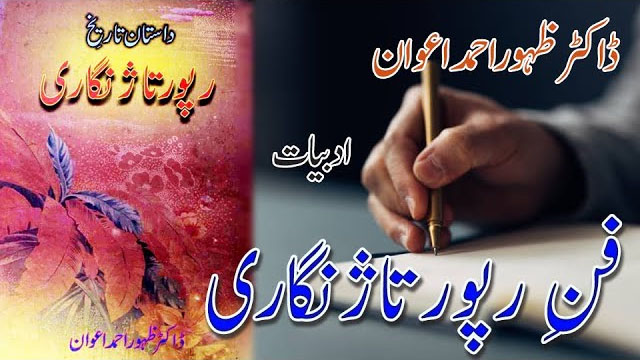Reportage writing refers to the art of describing events or places in a detailed, engaging, and informative manner. In Urdu literature, reportage writing has evolved into a unique genre, though it faces several challenges in achieving the level of creativity seen in other literary traditions. This blog delves into the importance of reportage writing in Urdu, its history, and the hurdles that prevent it from achieving its full artistic potential.
The Concept of Reportage Writing
At its core, reportage writing is more than just reporting facts. It aims to provide readers with a narrative that is both informative and engaging. Reportage writing in Urdu shares similarities with other languages but has faced difficulties in reaching the same level of literary sophistication. The aim is to not only inform but also emotionally connect with readers, turning real events into stories that resonate deeply.

The Historical Evolution of Reportage Writing in Urdu
Reportage writing in Urdu has undergone significant changes over the years. Dr. Zahoor Ahmad Awan’s book, Daastaan-e-Tareekh-e-Reportage (داستان تاریخ رپورتاژنگاری), offers a detailed exploration of the genre’s evolution. Awan’s work provides a historical perspective on reportage writing, showing how it has developed through different periods and comparing it with similar works in other languages. This comparison highlights the unique challenges Urdu writers face in this genre.
Despite its long history, reportage writing in Urdu has struggled to achieve the same level of creative excellence seen in other literary traditions. Dr Awan’s analysis critically examines the factors behind this gap and suggests ways in which reportage writing in Urdu can be elevated to new literary heights.
The Struggles for Creativity in Reportage Writing
A key challenge identified by Dr. Awan is that very few Urdu writers have successfully transformed reportage writing into a true literary form. While factual accuracy is often present, the creative and literary elements required to turn reportage writing into a masterpiece are frequently missing. The goal is to craft real-life events into a compelling narrative that not only informs but also captures the reader’s imagination.
Dr. Awan encourages Urdu writers to embrace a more creative approach to reportage writing. This means blending facts with literary artistry, creating narratives that are both intellectually stimulating and emotionally resonant. This combination of creativity and accuracy has been lacking in much of Urdu reportage writing, which is often more concerned with presenting information than with literary flair.
Zahoor Ahmad Awan’s Contribution to the Genre
Dr. Zahoor Ahmad Awan’s Daastaan-e-Tareekh-e-Reportage is a seminal work that not only provides an in-depth history of reportage writing in Urdu but also critically analyzes the genre. By comparing Urdu reportage writing with that of other languages, Awan offers valuable insights into what makes reportage writing effective in other cultures. He also emphasizes the need for Urdu writers to balance factual reporting with creative narrative techniques.
Awan’s work serves as a reminder that reportage writing is not just about conveying information, but also about presenting it in a way that is artistically engaging. He calls on Urdu writers to push the boundaries of the genre and take it beyond simple reporting.
The Future of Reportage Writing in Urdu Literature
The future of reportage writing in Urdu literature lies in the hands of writers who are willing to innovate. While the genre faces challenges, there is significant potential for it to evolve into a more creative and impactful form. Dr. Awan’s book inspires hope that future generations of Urdu writers will embrace the artistic aspects of reportage writing, pushing it toward a new era of literary excellence.
For reportage writing to flourish in Urdu, writers must find a way to blend truth with artistic expression. This will allow them to create stories that not only inform but also move and inspire their readers.
Conclusion: Elevating Reportage Writing in Urdu
In conclusion, reportage writing in Urdu literature has immense untapped potential. While the genre is often limited to factual reporting, it also has the ability to transform into a creative form that resonates deeply with readers. Dr. Zahoor Ahmad Awan’s critical examination of reportage writing offers a blueprint for how the genre can evolve. By embracing both creativity and factual accuracy, future Urdu writers can elevate reportage writing into a significant literary tradition.
If you’re interested in reading this book, click the link below for a free download.
https://drive.google.com/file/d/1g7e1H4cU9Mk9hy9nuUlDC26JF01JezJ0/view?usp=sharing
If you’d like to listen to this book in audio format, click the CONTACT button below to get in touch with the AwazeUrdu team to order the audiobook.
Contact us:Click the link below to watch the video on Facebook as well.
https://www.facebook.com/share/v/k1Ha7wBKUuZnYzyY
Click the link below to watch the video on Rumble as
Well: https://rumble.com/v5jk0hg-reporting..html?e9s=src_v1_ucp
کسی واقعے یاجگہ وغیرہ کےحالات بیان کرنارپورٹنگ کہلاتاہے، یہ لفظ اب اردومیں بھی اسی طرح بولاجاتاہے، جب کہ اردومیں اس کام کےلئےرپورتاژنگاری کالفظ مستعمل ہے۔ یہ بھی ادب کی ایک خاص صنف ہےجوتمام بڑی زبانوں میں لکھی جاتی ہے۔ آوازَاردو کےزُمرہءادب میں مختلف اصنافِ ادب کےبارے میں مضامین ویڈیوز کی شکل میں پیش کئے جاتے رہےہیں۔ اس صنف سےمتعلق جوسب سے اہم اورتفصیلی کتاب مجھے ملی ، وہ ڈاکٹرظہوراحمداعوان کی “داستان تاریخ رپورتاژنگاری” ہے۔
تقریباً گیارہ سوصفحات کی اس کتاب میں رپورتاژنگاری کی تاریخ بیان کرنےکےساتھ مختلف ادوار میں لکھی گئی مشہوررپورتاژیں بھی جمع کی گئی ہیں۔ اس کےعلاوہ دوسری زبانوں کی رپورتاژوں کےتراجم بھی پیش کئے گئےہیں، تاکہ ان کا اردورپورتاژسے تقابل کیاجاسکے۔ اس ویڈیو میں اس کتاب کا ایک اقتباس پڑھاگیاہے، جس میں بتایا ہے کہ اردوزبان میں لکھی گئی رپورتاژوں میں سے بہت کم اس معیارکی ہیں، جنہیں تخلیقی اعتبار سے فنی شاہکار قرار دیاجاسکے۔ یعنی حقیقی واقعات کواس طرح بیان کرنا کہ اس میں ادبی چاشنی پیداہوجائے،اردو کےچندمصنفین ہی اس معیار تک پہنچے ہیں۔ ایک طرح یہ ایک تنقیدی مضمون ہے

